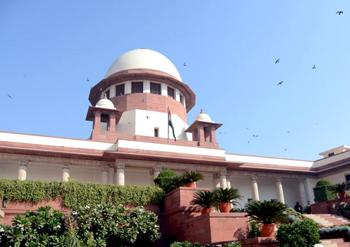New Delhi, Oct 16: In a landmark judgment, the Supreme Court today declared as unconstitutional the law brought by the NDA government to replace the over two-decade- old collegium system of judges appointing judges in the higher judiciary.

The unanimous verdict quashing the NJAC Act was delivered by a five-judge Constitution bench comprising justices J S Khehar, J Chelameswar M B Lokur, Kurian Joseph and A K Goel which also rejected the plea of Central government to refer for review to larger bench the 1993 and 1998 verdict of the apex court on the appointment of judges to the higher judiciary.
While four judges held as unconstitutional the 99th amendment of the Constitution, Justice J Chelameswar differed with them and gave his own reasons for upholding its validity.
Justice Khehar, who pronounced the judgment for the bench, said that the system of appointment of judges to the Supreme Court and the Chief Justice and judges of the high courts and transfer of judges from one high court to another has been existing in the Constitution prior to the 99th amendment.
The bench also said it was willing to take suggestions for improving the collegium system of appointment of judges and posted the hearing for November 3.
Justice Khehar said each one of us have recorded their reasons and order has been jointly signed.
The five-judge bench had reserved its judgment on July 15 on a bunch of pleas challenging the consitutional validity of the NJAC Act and the 99th amendment in the Constitution after a marathon hearing for 31 days on the issue.
The petitions challenging the new legislation were filed by Supreme Court Advocates on Record Association (SCAORA) and others contending that the new law on the selection and appointment of judges was unconstitutional and aimed at hurting the independence of judiciary.
However, the Centre had defended the introduction of the new law saying that the two-decade-old collegium system where judges appointed judges was not free from defects and got the support of the Supreme Court Bar Association.
The measure was also supported by 20 state governments which had ratified the NJAC Act and the constitutional amendment.
One of the contentious provisions of the new law was the inclusion of two eminent persons to the NJAC which included Chief Justice of India, two senior most judges of the apex court and the Union Law Minister.
Under the law, two eminent persons will be nominated by a committee consisting of the Chief Justice of India, Prime Minister, and Leader of Opposition in the Lok Sabha or where there is no such LoP, the leader of single largest Opposition Party in the House.
Further, it envisaged that of the two eminent persons, one would be from the Scheduled Castes or Scheduled Tribes or OBCs, minority communities or a woman.
As per the Act, the eminent persons shall be nominated for a period of three years and shall not be eligible for re-nomination.
The issue of eminent persons on the panel was a major bone of contention between the parties and, on final day of hearing, the bench had differed with the Centre, saying inclusion of laymen in the new system of judicial appointments "cannot work".
Defending the provision for inclusion of two eminent persons, Attorney General Mukul Rohtagi had said, "If we can have laymen in some other Commissions and Tribunals then why not in the six-member NJAC."
Noted jurists like Fali Nariman, Anil Divan and Ram Jethmalani were among prominent senior advocates who had argued against the NJAC replacing the collegium system.





Comments
Add new comment